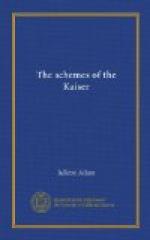Perched above every political party in Germany, William the Young wants to be the one and only ruler and judge of all. Among themselves let them differ as and when they will, it being always understood that all these separate opinions must equally be sacrificed to the Emperor.
Before long the King of Prussia will endeavour to be at one and the same time the spiritual head of the Lutheran Church and the temporal Pope of the Catholic Church, the leader of economists, the cleverest of stategists, the one and only socialist, the most marvellous incarnation of the warrior of German legends, the greatest pacifist of modern times, explorer in his day and soothsayer whenever he likes. In his own eyes, William is all these.
Have not the delegates of the old House of Peers ingenuously complained during these last few days that they no longer possess any initiative of legislation? But they have just as much or as little as the honourable members of the Prussian Diet.
All schemes of reform emanate from the Emperor. The people have no right to be Emperor. Surely that is simple enough?
To bulk larger in the public eye, William dwells apart; he can no longer endure that any one should presume to think himself useful or agreeable to him or to give him advice. He is fulfilling the prediction that he made of himself when he was twenty-one: “When I come to reign I shall have no friends; I shall only have dupes.”
More infatuated with himself than ever, the Emperor wears his mystic helmet a la Lohengrin, tramples the purple underfoot and has the throne surrounded by his life-guards, wearing the iron-plated bonnets of the days of Frederick II. Thus he deludes himself with the dream of absolute authority. His mania for power is boundless, his pride knows no limits. He recognises only God and Himself.
To his recruits, he says: “After having sworn fidelity to your masters upon earth, swear the same oath to your Saviour in Heaven!”
But in his moments of solitude, in the privacy of the potentate’s toilet-chamber, must it not be dreadful for him to reflect that his silver helmet rests on ears that suppurate, that his voice comes from a mouth afflicted with fistula of the bone, and that there are days when his sceptre is at the mercy of the surgeon’s knife?
December 11, 1890. [17]
The rumour has spread, and has not yet been authoritatively contradicted, that William is suffering from disease of the brain. Is not this in itself good and sufficient reason to make him wish to prove that no one in his Empire can do as much brain work as he can? We, whose minds are so confused in the endeavour to follow William’s movements at a distance, where little things escape us, can imagine what it must be to observe them from close at hand!
One of the chief glories of his reign will be to have produced the diagnosis of a new disease, “locomotor Caesarism” of the restless type. Before his case, these symptoms were always associated with paralysis. Here is a discovery that may turn out to be more genuine that that of Dr. Koch.




